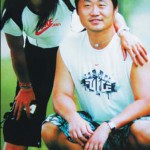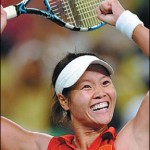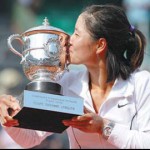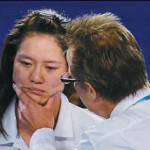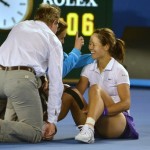By Sun Xiaochen in Melbourne, Australia, and Lei Lei in Beijing (China Daily)
Losing the final of the Australian Open is unlikely to stop Li Na from becoming a global superstar.
China’s 30-year-old tennis ace twisted an ankle and also hit her head as she contested the final against Victoria Azarenka of Belarus on Saturday night. However, she earned immense respect, helped to rejuvenate her career and gave another boost for the sport in her home country.
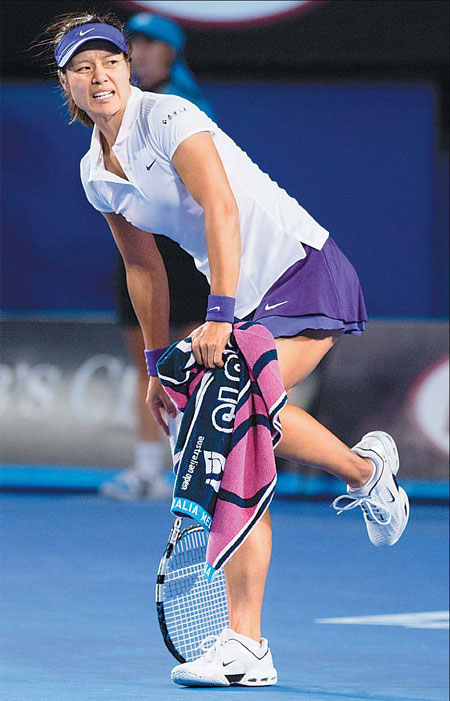
“Your play has moved a nation of people,” wrote the former NBA All-Star Stephon Marbury on his micro blog. “I, myself, was moved at seeing your amazing performance.”
Defeat makes us stronger, he added.
Marbury was one of 15 million followers who tweeted about Li’s final on Saturday, where the injured Chinese player lost to the world No 1 6-4, 4-6, 3-6.
|
|
Sixth seed Li twisted her left ankle early in the second set, before rolling the same ankle when play resumed after a 10-minute break for the Australia Day fireworks. She lost her balance and crashed down, her head hitting the ground.
The sound of Li’s head hitting the surface silenced the crowd, making them sit up, watch and pray. However, the Chinese No 1’s typical grin soothed the tensions and she quickly returned to the court, while her millions of online followers hoped for the best and encouraged her. |
“I was really moved by your smile during the injury and by your tears after the match,” wrote Gao Ying, a company manager from Qingdao, on her Weibo. “I laughed and cried with you. There is regret, but no disgrace, because you’ve done your best. You are really great.”
Former world champion hurdler Liu Xiang, whose repeat heel injury foiled his comeback at the London Olympics, also praised his compatriot. “Don’t be sad ‘Sister Na’. There is no regret, just pride. You’ve lived beyond yourself. The best is yet to come,” wrote Liu on his micro blog.
During two weeks at the Rod Laver Arena in Melbourne, Li moved tennis fans across the world with her humor, feisty personality and heartfelt performance on court.
Colorful antics
From joking about her age by pointing out that she is younger than her on-court interviewer, to confessing that she dispatched her snoring husband to another bedroom, Li’s colorful antics never disappointed the fans.
“She’s not from my country but she’s an Asian representative. It makes me proud to see an Asian player doing so well at the AO, and she is so funny all the time,” said Chin Awe-yeong, a fan from Malaysia, interviewed at courtside after watching Li’s semifinal against Maria Sharapova.
|
|
Kevin Hutchison, a doctor from Scotland, echoed that sentiment: “It’s the first time I’ve seen her play, but if she’s played that well throughout her career, it’s probably why (so many foreigners root for her). The way she talks is very entertaining and (she’s) good to watch,” said Hutchison after watching the final on an open-air screen with friends and a few beers at Melbourne’s Federation Square. |
After winning the 2011 French Open to become Asia’s first Grand Slam singles champion, Li became a household name in China. She has also been rated as the world’s second-richest sportswoman by Forbes magazine, behind only Sharapova.
The victory saw Li, who boasts more than 15 million followers on her micro blog, commemorated with a bronze statue in her home city of Wuhan, the capital of Hubei province. Meanwhile, a string of lucrative endorsements prove that she is now one of China’s most-recognized athletes, alongside former NBA star Yao Ming and hurdler Liu.
Her appearance in a second Melbourne final has cemented her standing as a leading Chinese sports figure: Yao has retired, Liu is hampered by injury and the rising swimming star, Sun Yang, has yet to reach his full potential.
Piers Newbery, a senior BBC tennis reporter who regularly follows Li, said her strong character distinguishes her from other Chinese athletes. “It’s really interesting, because she is more individual,” Newbery said in an interview with China Daily ahead of the final. “We saw China’s success at the Olympics, but we didn’t get to know the individuals. Probably (because) they don’t speak English in interviews. Li Na is a success outside of the Olympics. She does great interviews, she makes everyone out there laugh and her press conferences are always entertaining. It will definitely help her gain more international acceptance. Ultimately, people will be interested in the personality beyond the nationality.”
World recognition
John Pye, the Asia-Pacific sports editor of Associated Press, predicted that Li will eventually achieve even greater international recognition than Yao: “I would say that Yao remains the most renowned sports figure in China in the eyes of foreigners, but he’s retired from sport’s center stage. With his influence declining, I think Li will probably step up to become the new darling,” he said.
Despite the pain and the tears she wept during an interview with China Central TV after the Melbourne final, Li rediscovered her confidence and is eyeing an even brighter future.
“I’ve doubted whether I could come back over the past 600 days (since the win at Roland Garros in Paris). But I started to trust myself again (to win another major) at the end of last year and figured out that what I could improve is my altitude and mental control,” she admitted.
Off-court distractions and a loss of form saw Li’s career slump after the French Open. She failed to claim a title for 18 months until Carlos Rodriguez, the former mentor of seven-time Grand Slam winner Justine Henin, became her coach in the summer.
At their first tournament together, in Cincinnati, Li won her sixth title before moving on to claim a seventh championship in Shenzhen last month.
Rodriguez’s tough training regime and mental tune-up work helped Li to improve her serve and emotional management en route to the Australian Open final, without dropping a set. “It’s been a long, grinding journey for me. No one but me knows how hard it has been,” she said.
Earning international headlines for pulling Li out of her career dip, Rodriguez said the Chinese player’s performance in Australia was pleasing, the loss in the final notwithstanding.
“When you (the spectators) go out there, you will be so excited for her,” said the softly spoken Argentinian after the final. “The biggest positive is that she can compete against the world’s best players and can still make a lot of progress in terms of managing herself on court. Now, we can find solutions for next time to handle that. There are a lot of improvements to make. It’s been a wonderful tournament.”
Although she sobbed because she was unable to claim the title as a seventh-wedding anniversary (on Sunday) gift for her husband Jiang Shan, Li said she’s learned to be positive.
“At least I saw myself regaining my form. I am still hungry for titles. I tried my best (to win the trophy for Jiang), so I can forgive myself,” she said.
With Li reaching the sport’s highest level once again, tennis will gain another boost in China, according to Steve Ayles, commercial director of Tennis Australia.
“I think it will be very helpful (in promoting tennis in China), because she’s so popular and so successful already. There will be another surge of interest. What she does fantastically well is she actually gives belief to the next generation of Chinese players about what you can achieve with the commitment, the passion and the hunger. It proves to other Asian players (that) if you dream you can achieve,” he said.
Talent pool deepens
Led by Li and two other highly ranked women players, Zheng Jie and Peng Shuai, China sent its largest-ever contingent of 14 players (including main-draw players, qualifiers and juniors) to Melbourne, marking a deepening of the country’s talent pool.
Meanwhile, more is expected because the combined efforts of the governing body in China and private investors have paid off in terms of grassroots development.
According to a report in Tennis Magazine, 10 professional tennis academies currently operate in China, in addition to local sports systems. Meanwhile, the number of amateur clubs has soared since Li’s grand slam feats.
“It’s changed a lot in the 10 years I’ve been visiting China. There’s a lot more interest in the sport generally. You are starting to see more opportunities for Chinese players to play at home and to travel to other countries, where tennis is already a major sport. The interest will continue to grow and the performances of players like Li Na will help it grow even faster and further,” said Ayles.
Bringing new tournaments, such as this year’s WTA Shenzhen Open and the Premier 5 event in Wuhan next year, the Chinese Tennis Association has decided to push forward its professional reforms by allowing the players more freedom.
That fact was evident as Xu Shilin, a 15-year-old who competed at the Australian Open’s girls’ event, chose to manage her own career with a personal coach and agent, just as Li was allowed to do after the 2008 Beijing Olympics.
“Her (Li’s) success proved that this is the right way to go, so I think I can emulate her path to realize my dream to be the world No 1,” said the forthright teenager. Xu’s vision may sound a little over-ambitious, but the impact of a good role model shouldn’t be underestimated.
Newbery believed that after reaching three major finals, Li’s influence will mirror the effect that world No 3 Andy Murray had on British tennis last year.
“In Britain, the interest in Murray (after his Olympic and US Open wins) is huge. The Premier League (soccer) is the biggest thing, but Murray winning a Grand Slam and being in the final again will get the sport close to that.
“I imagine the same for Li, if that translates into people picking up a racquet and playing tennis. It’s been a different story in the UK. People love to watch and enjoy the sport, no matter whether they play or not.”

